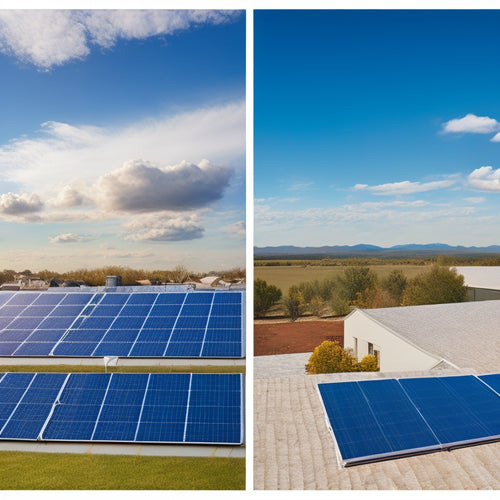
Avoidable Mistakes in Residential Solar Panel Financing
Share
When financing residential solar panels, you'll want to avoid common mistakes that can cost you thousands in the long run. Failing to research providers can lead to untrustworthy installations, while incorrect system sizing calculations can result in inadequate energy supply. Inadequate roof assessments can lead to system failure, and ignoring local incentives can mean leaving money on the table. Misunderstanding lease agreements, poor credit score preparation, and inadequate energy efficiency audits can also lead to financial losses. Don't fall prey to unrealistic energy savings expectations, and instead, take the necessary steps to guarantee a smooth shift to solar power - and there's more to contemplate in your path to a successful installation.
Key Takeaways
- Failing to research and evaluate solar panel financing providers can lead to a negative experience and financial loss.
- Neglecting to assess roof condition and structural integrity can result in costly repairs or system failure.
- Not understanding credit scores and reports can lead to unfavorable loan terms, high interest rates, or loan rejection.
- Overlooking the fine print in financing agreements can result in unexpected expenses, hidden fees, and long-term financial burdens.
- Ignoring local incentives and state tax credits can miss out on significant savings and reduce the overall benefits of solar panel investment.
Failing to Research Providers
When venturing into solar panel financing, it's vital to dedicate time to researching providers, as this initial step can make or break the entire experience.
You'll want to carefully evaluate potential providers to guarantee you're working with a reputable company that can deliver on its promises. A provider's reputation is significant, so you should thoroughly review customer testimonials, ratings, and reviews to get a sense of their track record.
You can also check if they're certified by industry organizations, such as the North American Board of Certified Energy Practitioners (NABCEP). Additionally, research the provider's financial stability and experience in the solar industry.
Look for red flags like lawsuits, complaints, or bankruptcies. By doing your due diligence, you'll be more likely to find a reliable provider that can guide you through the financing process and facilitate a successful solar panel installation.
Don't risk your investment by skipping this pivotal step – take the time to research and choose a trustworthy provider.
Incorrect System Sizing Calculations
Your solar panel system's performance hinges on its size, making accurate calculations crucial. If you undersize your system, you'll fall short of meeting your energy demands, and oversizing will result in unnecessary costs. To get it right, you must accurately assess your energy usage patterns. This involves analyzing your past utility bills to determine your average daily energy consumption in kilowatt-hours (kWh).
You'll also need to take into account factors like your home's insulation, window orientation, and local climate, as these can impact your energy demands.
Next, you'll need to calculate your system capacity, which is measured in watts (W). A common mistake is to base system capacity solely on your current energy consumption. However, you should also take into account your future energy needs, such as adding electric vehicles or appliances.
Inadequate Roof Assessment
Accurate system sizing is just the beginning; a solar panel system's performance also relies on a suitable roof to support it. When you're considering solar panel financing, it's vital to assess your roof's condition and structural integrity to guarantee it can handle the weight and stress of the system.
You'll need to evaluate the solar orientation of your roof to determine the best installation angle for maximum energy production. A shading analysis will also help identify potential obstacles that could impact system performance.
Furthermore, you should consider the material durability and weather considerations specific to your region. For instance, if you live in an area prone to heavy snowfall or high winds, your roof will need to be able to withstand these conditions.
Long-term maintenance is also an essential factor, as a poorly maintained roof can lead to system failure or reduced performance. By conducting a thorough roof assessment, you can avoid costly surprises down the line and guarantee your solar panel system operates at its full potential.
Ignoring Local Incentives
When financing solar panels, you need to contemplate the local incentives available to you.
You may be eligible for state tax credits, which can greatly reduce your taxable income, or utility rebates that can offset the upfront cost of your solar panel system.
State Tax Credits
The financial benefits of going solar extend far beyond federal incentives, and homeowners often overlook the state tax credits available to them. You should take advantage of these credits to maximize your savings.
| State | Tax Credit Amount | Eligibility |
|---|---|---|
| California | 10% of total cost | Residential and commercial properties |
| New York | 25% of total cost (capped at $5,000) | Residential properties only |
| Arizona | 25% of total cost (capped at $1,000) | Residential and commercial properties |
When claiming state tax credits, you'll need to verify you meet the eligibility criteria. These credits can greatly reduce your tax liability, and in some cases, you may be able to carry over excess credits to future years. Don't assume you're automatically eligible; review the specific requirements for your state and consult with a tax professional if needed. You've already made the investment in solar panels – make certain you're getting the full financial benefit.
Utility Rebates
Beyond state tax credits, you should also investigate utility rebates, which can further reduce the cost of going solar. These rebates are offered by your utility company to encourage the adoption of renewable energy sources. To take advantage of these incentives, you must understand the rebate eligibility criteria and application process.
Rebate eligibility typically depends on factors such as your location, system size, and installation date. You'll need to verify your solar panel system meets the utility company's technical requirements, such as interconnection standards and performance metrics. Additionally, you may need to provide documentation, like system design and installation reports, to demonstrate compliance.
The application process usually involves submitting an online or paper application, along with required documents, to the utility company. Be prepared to provide detailed information about your system, including its size, installation date, and expected energy output.
Once your application is approved, the utility company will issue a rebate, which can be used to offset the upfront cost of your solar panel system. By understanding the rebate eligibility criteria and application process, you can maximize your savings and accelerate your return on investment.
Misunderstanding Lease Agreements
Frequently, homeowners are lured into solar panel lease agreements without fully grasping the long-term implications. You might be tempted by the promise of low or zero upfront costs, but it's crucial to carefully review the contract terms before signing.
While lease benefits, such as predictable monthly payments and warranty coverage, can be attractive, they may come with significant trade-offs. For instance, you may not own the system, which means you won't benefit from the increased value of your property. Additionally, you might be locked into a long-term contract with escalating payments.
You should also consider the impact of lease agreements on your ability to sell your property in the future. To avoid misunderstandings, take the time to thoroughly review the contract terms and calculate the total cost of the lease over its lifetime.
Don't assume that the lease benefits will outweigh the potential drawbacks – crunch the numbers and make an informed decision.
Overlooking Hidden Fees
Since you're investing in solar panels to save money on energy bills, it's vital to scrutinize the financing terms to avoid surprise expenses. Overlooking hidden fees can lead to unexpected costs that negate the benefits of going solar.
When reviewing financing options, confirm you have complete fee transparency. Ask your lender to disclose all fees associated with the loan, including origination fees, late payment fees, and prepayment penalties.
Carefully review the contract terms to understand the total cost of financing. Be aware of any fees tied to the loan's interest rate, as these can add up quickly.
Additionally, check if there are any fees for maintenance, repairs, or replacements. Some financing options may include annual fees or monthly charges that can increase your overall cost.
Poor Credit Score Preparation
You'll want to review your credit report to identify any errors or inaccuracies that could be negatively impacting your credit score.
By doing so, you can take steps to improve your credit history, such as disputing incorrect information or paying down outstanding debts.
A thorough review of your credit report will help you address any issues that could jeopardize your solar panel financing options.
Check Credit Report
When applying for solar panel financing, it's essential to take a proactive stance in preparing your credit report, as a poor credit score can greatly impact your chances of securing a favorable loan. You'll want to review your credit report carefully, checking for errors, inaccuracies, and outdated information.
Verify that all accounts are correctly listed, and confirm that your credit utilization ratio is accurate.
The credit report importance can't be overstated, as lenders rely heavily on this document to assess your creditworthiness. A single mistake or inaccuracy can negatively impact your credit score, making it more difficult to secure a loan with favorable terms.
You should also be aware of the credit score impact of recent credit inquiries, late payments, and high credit utilization. By carefully reviewing your credit report, you can identify areas for improvement and take corrective action before applying for solar panel financing.
This proactive approach will help you avoid costly mistakes and guarantee that you're well-prepared to secure the best possible loan terms.
Improve Credit History
Now that you've reviewed your credit report, it's time to focus on improving your credit history, particularly if your score is less than ideal. A poor credit score can lead to higher interest rates or even loan rejection, making it essential to take corrective measures.
Start by addressing high credit utilization, which occurs when you've used a significant portion of your available credit. Aim to reduce your credit utilization ratio to below 30% to demonstrate responsible credit behavior.
Next, prioritize debt management by creating a repayment plan that tackles high-interest debts first. Consider consolidating debt into lower-interest loans or credit cards, and make timely payments to avoid further credit score damage.
Inadequate Energy Efficiency Audit
Through improper prioritization, many homeowners overlook an important step in the solar panel financing process: conducting a detailed energy efficiency audit. You might assume that installing solar panels will automatically reduce your energy consumption, but that's not always the case.
Without an extensive audit, you may not identify areas in your home where energy is being wasted, which can negatively impact the overall efficiency of your solar panel system.
A detailed energy efficiency audit helps you understand your energy consumption patterns, identifying opportunities to reduce energy waste and optimize your solar panel efficiency. This includes evaluating insulation, windows, lighting, and appliances to determine where energy is being lost.
By addressing these issues, you can guarantee that your solar panels are generating the maximum amount of energy possible, reducing your reliance on the grid and saving you money in the long run.
Not Reading Fine Print Carefully
Your solar panel financing agreement is a binding contract, and it's vital you understand every aspect of it. Failing to read the fine print carefully can lead to costly mistakes that'll leave you feeling powerless. You must possess strong reading comprehension skills to decipher the complex terms and conditions.
| Term | Implication | Action Item |
|---|---|---|
| Interest Rate | Higher payments over time | Calculate total cost of financing |
| Payment Terms | Missed payments can lead to penalties | Set up automatic payments |
| Warranty Coverage | Limited protection for equipment failure | Review warranty terms and conditions |
Don't assume you're getting a good deal just because the salesperson says so. It's important you exercise financial literacy when reviewing your financing agreement. Take your time, and don't be afraid to ask questions. Remember, a small mistake now can lead to a significant financial burden later.
Unrealistic Energy Savings Expectations
Since solar panels generate electricity based on their capacity and the amount of sunlight they receive, it's vital to have realistic expectations about the energy savings you'll achieve.
Unrealistic expectations can lead to disappointment and affect your financial planning. You must understand that solar panels won't eliminate your energy consumption entirely, but they'll considerably reduce your reliance on the grid. Be cautious of solar myths that promise exaggerated savings.
To set realistic expectations, consider factors like your energy usage patterns, installation timeline, and system maintenance requirements. A well-maintained system will guarantee ideal performance and long-term savings.
Don't forget to factor in technology advancements that may enhance your system's efficiency over time. By doing so, you'll be able to accurately assess the environmental impact of your solar panel investment and make informed decisions about your financing options.
Frequently Asked Questions
Can I Use a Home Equity Loan to Finance My Solar Panels?
You can use a home equity loan to finance your solar panels, leveraging your property's value to tap into a lower-interest loan with tax-deductible interest, offering more loan advantages and flexible repayment terms.
How Do I Know if My Solar Panels Will Increase My Property Value?
Did you know that homes with solar panels sell for an average of $15,000 more? To determine if your solar panels will increase your property value, you'll need a property appraisal, which considers solar incentives and local market conditions to calculate the added worth.
Are There Any Government-Backed Solar Financing Options Available?
You'll find government-backed solar financing options, such as FHA's PowerSaver loan and VA's Energy Efficient Mortgage, offering favorable terms. Additionally, you can utilize federal incentives like the Solar Investment Tax Credit and investigate solar grants, like the USDA's Rural Energy for America Program.
Can I Cancel My Solar Panel Contract if I'm Not Satisfied?
You can potentially cancel your solar panel contract if you're not satisfied, but it's essential to review the agreement's terms and conditions regarding contract cancellation, ensuring you understand the process and any associated fees for early termination.
Do I Need to Purchase a Battery With My Solar Panel System?
Did you know 70% of homeowners consider energy storage essential for their solar systems? You don't necessarily need to purchase a battery with your solar panel system, but it can provide benefits like backup power during outages, offsetting peak hour rates, and increasing grid independence, although battery costs can add up quickly.
Related Posts
-

Top 10 DIY Conversion Kit Reviews and Tips
You're taking the first step towards electrifying your ride, and with the right DIY conversion kit, you'll be cruisin...
-

Tracking Solar Panels Vs Fixed Panels Cost Savings
When considering solar panel options, you'll want to weigh the cost savings of tracking solar panels versus fixed pan...
-

Reduce Solar Panel Cost for Your Small Home
By evaluating your energy needs, choosing the right installer, and selecting cost-effective solar panel options, you ...


